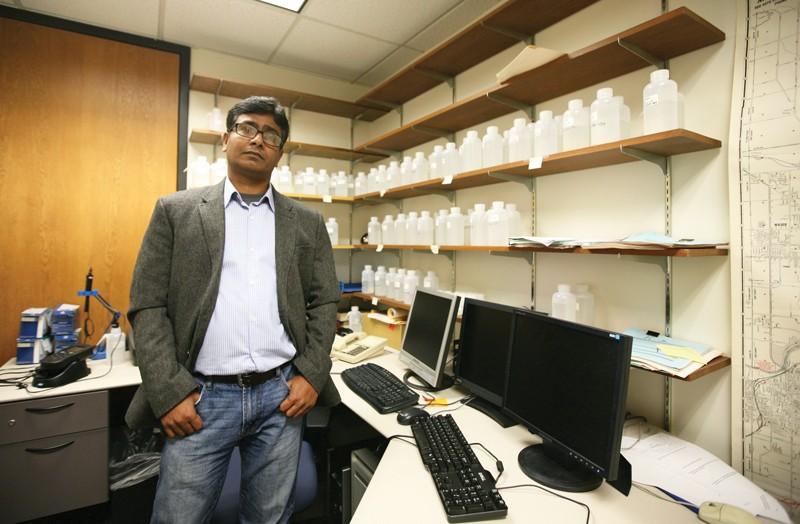International professors engage in the campus community

GVL / Robert Mathews Dr Azizur Molla
Jan 13, 2013
Azizur Molla, an associate professor of the anthropology department at Grand Valley State University, hails from Bangladesh, and when he’s not teaching, he conducts collaborative research in Haiti and Bangladesh concerning water sanitation — a topic that he holds close to his heart.
In the village where Molla is from, there were no good roads, electricity or running water, he said. While doing his undergraduate studies specializing in public health, he visited home and was sent to bathe in a polluted river alongside cattle and other bathers.
“It was tough for me since I was learning about public health while following the cultural codes of my villagers,” Molla said. “So I was following them but I wasn’t compromising at that. I tried to talk to my mom but it was not well received by my neighbors.”
Molla said other villagers saw him trying to change things in the village according to his knowledge that the water was bad for them as disrespectful.
“My scientific knowledge was not well received,” he said. “They were only seeing the negative. Since I went to the university now, I’m not showing respect to my elders.”
Now, Molla is researching for a way to solve the issue of polluted water both for his village and many others in countries all over the world.
Molla is just one of many foreign professors at GVSU who brings his culture and life experience into his academic pursuits. Many of the professors get involved in university life outside of teaching.
Anne Caillaud is an associate professor in the modern languages and literatures department, and she is originally from France. On campus, she is involved as an adviser of the French Club, does research in medieval French literature, and does service and committee work. Currently, Caillaud is involved in the international task force, which was put together by the provost.
“I’m in a subcommittee that deals with staff and faculty members like finding out who is international, finding out what impact we want to be able to have on the students, and how we can internationalize our campus,” Caillaud said.
Russia-native Elena Lioubimtseva is an associate professor in the geography department and the director of the Environmental Studies program at GVSU. Lioubimtseva is an adviser of the environmental coalition, does research focused on climate change and participates in sustainable community development initiatives.
“I’m interested in how climate change affects society,” Lioubimtseva said. “I’m particularly interested in the way climate change affects food security and human health.”
Lioubimtseva said that her research is focusing on the impacts of climate change in Russia, central Asia and developing countries, and she has written about 17 publications focused on climate change.
While these professors have jumped right into American life and academia, many of them had to overcome cultural differences to feel truly comfortable.
Lioubimtseva said that the biggest cultural difference she noticed between Russia and the U.S. was the formality between students and professors. Lioubimtseva said she also enjoys more interaction with the students but had to learn to adjust her teaching style so it was more interactive.
“I came from a country where that relationship was much more formal,” Lioubimtseva said. “That was probably the main surprise, and it was a very pleasant surprise. I definitely enjoy that the U.S. is much more informal. Usually there is this big distance between students and professors, and I enjoy the absence of this culture here.”
Likewise, Caillaud said the biggest difference she noticed was that students and faculty have much more interaction in the U.S. than in France. “The professors here are much closer to the students,” she said. “In France, there’s pretty much no relationship at all. You go to class, but you never see or talk to your professor outside of class.”
Caillaud said she enjoys engaging in dialogues with the students, because she didn’t see that happening in France.
“In France, things are much more formal,” she said. “I kind of enjoy this informality that exists in the American system.”
Molla said the biggest difference he noticed when coming to the U.S. was family differences. In Bangladesh, family is the center of everything and they spend a lot of time together and are very close to each other. Molla said that in many parts of the U.S., children are more or less out on their own after age 16 or so.
“That kind of shocked me,” he said. “That is the time boys and girls need good mentors from parents. That’s really not the culture in our country.”
In spite of the recognized independence of youth in the U.S., Molla had some words of advice for his students.
He encouraged them to take the world they have today and try to make it better for tomorrow.
“You should learn and demonstrate that (academic) learning in society and benefit the next generations,” Molla said.
[email protected]






















